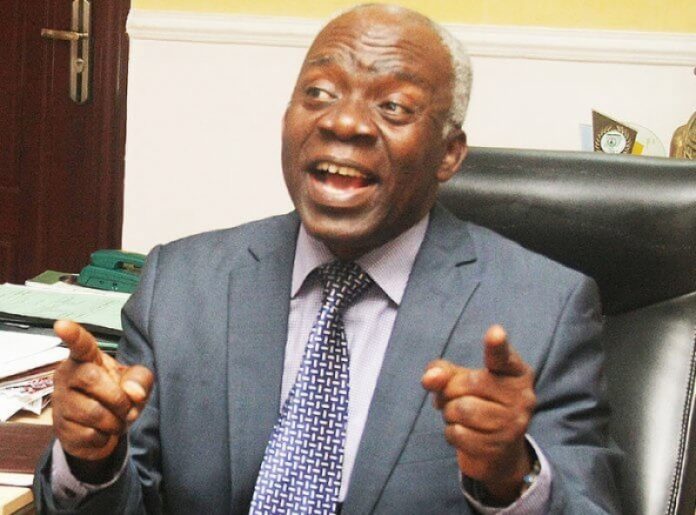The idea that there was no law that mandates President Muhammadu Buhari to declare his assets publicly has been punctured by a Nigerian human rights lawyer.
The presidential spokesperson to Mr Buhari, Femi Adesina, speaking on a private television programme, said no law compelled his principal to make public his assets in his second term.
The presidency was reacting to the demand of the Socio-Economic Rights and Accountability Project, SERAP, which urged Mr. Buhari, Vice President Yemi Osinbajo and the 36 state governors to make their assets public in seven days, said there was no such law.
SERAP, in its statement on Sunday, argued that the non-disclosure by the officials “seriously undermines the effectiveness and integrity of the constitutional and statutory obligations to submit asset declarations.”
Disagreeing with Presidency, Mr Femi Falana, SAN, rights activist and lawyer, has insisted that “The law contemplated by the Constitution to make asset declarations of public officials is the FoI Act. With the FOI Act, there is no longer secrecy in government, including in the asset declarations made by all public officials.
“The combined effect of the Constitution, FOI Act and the African Charter is that all public officials ought to voluntarily announce publicly their asset declarations even without prompting from civil society groups like SERAP.”
Falana said, “I have read the FoI requests by SERAP giving President Buhari, Vice-President Osinbajo, 36 state governors and their deputies 7 days to publicly declare any updates on their asset declarations submitted to the CCB.
“The Presidency has claimed that there is no law in Nigeria mandating President Buhari to declare his assets publicly. With due respect, this cannot be the correct position of our law. As far as the law is concerned, the word “declaration” means “a formal statement, proclamation, or announcement, especially embodied in an instrument.” See page 467 of Black’s Laws Dictionary (Ninth Edition).
“The combined effect of the Constitution, FOI Act and the African Charter is that all public officials ought to voluntarily announce publicly their asset declarations even without prompting from civil society groups like SERAP.
“In the alternative, the Code of Conduct Bureau is bound by law to make them available to members of the public, pursuant to section 1 of the FOI Act.
“In fact, the law contemplated by the Constitution to make asset declarations of public officials public is the FoI Act. With the FOI Act, there is no longer secrecy in government, including in the asset declarations made by all public officials.
“No more excuses by public officials, as the National Assembly has, bypassing the FoI Act, prescribed the terms and conditions for pubic officials and the CCB to publicly make asset declarations available. In this instance, SERAP has correctly invoked the provisions of the Constitution, FoI and the African Charter.
“Similarly, Section 22 of the Constitution has imposed a duty on the mass media to promote public accountability and transparency.
“Even private citizens can no longer insist on secrecy as they are now required by official policies to register their biometric data for the purpose of acquiring international passports, telephone lines and opening of bank accounts.
“The Bank Verification Number commonly called BVN–a biometric identification system implemented by the Buhari administration–has ended secrecy of bank accounts, thereby curbing illegal banking transactions in Nigeria.
“All that SERAP is asking is for the Presidency, governors and their deputies to announce their asset declarations as submitted to the CCB. Such an announcement will help to update the records of what the President and Vice President already made public and refresh the memory of the public who are keen to see transparency and accountability in the implementation of the asset declarations frameworks in Nigeria.
“I, therefore, urge President Buhari and Vice President Osinbajo to show strong leadership by immediately acceding to the FoI requests by SERAP and publicly announce any updates on their asset declarations already made public in 2015.”
Arguing, Adesina said such a decision to make the assets public “is a voluntary will and not a compulsion. The president will do what the law requires of him and I can say for a fact that the president has declared his assets.
“Declaring that publicly is not in our law but voluntary. Therefore, he cannot be compelled to do so. If FOI Act is invoked, it will be left with the Code of Conduct Bureau to release such information. The president has declared and already deposited the documents to them. So, it’s left to them to make such a decision.”

